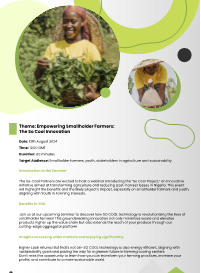SO-COOL: Revolutionizing Crop Preservation with Ai & Solar-Powered Cooling Systems
 Challenge Overview
Challenge Overview
Context:
In tropical regions, particularly in African countries, farmers face severe challenges from extreme heat that drastically affects crop yields and increases spoilage rates. Existing cooling systems, which are often powered by diesel, contribute to high carbon emissions and operational costs. These systems are inefficient, leading to shorter self-lives for crops and significant post-harvest losses. For example, in many African countries, it is estimated that up to 30% of harvested produce is lost due to inadequate cooling and storage facilities. This not only impacts food security but also results in market exploitation where farmers are forced to sell their produce at reduced prices due to spoilage and compromised quality.
Problem Statement:
The challenge was to develop a sustainable and cost-effective cooling solution that could be integrated into small farms. The goal was to address the adverse effects of high temperatures on crops, enhance yields, and minimize spoilage while reducing reliance on carbon-intensive diesel-powered systems.
Proposed Innovation
Innovative Approach:
SO-COOL is currently in development and aims to transform agricultural cooling with a solar-powered system designed to provide consistent cooling during peak heat periods. This innovative approach is expected to extend the shelf life of crops, reduce spoilage, and boost farm productivity. Additionally, SO-COOL will incorporate advanced cooling technologies and utilize AI for aggregating climate data to enable intelligent adjustments to the cooling system based on real-time and forecasted conditions.
Technology Requirements:
The system will use solar energy, reducing carbon emissions compared to diesel-powered alternatives. It will also integrate AI-driven data aggregation to enhance cooling efficiency and adapt to environmental changes.
Development Stage and Future Prospects
Implementation: SO-COOL is set to launch in approximately nine months, with a pilot program planned for several small farms in an African tropical region. This initial phase will test the system’s effectiveness in reducing crop spoilage and improving overall farm productivity.
Expected Outcomes and Impact:
Although still under development, the expected outcomes include substantial improvements in crop yield and reductions in post-harvest losses. With a successful pilot, SO-COOL aims to address the high crop loss rates—up to 30% in some African regions—by extending the shelf life of produce and enhancing market value through reduced spoilage.
Scalability and Future Potential:
Following a successful pilot, SO-COOL has the potential for international deployment. Future developments will include AI-driven climate prediction models to optimize cooling systems based on predictive data, making the technology adaptable to various agricultural environments and significantly expanding its global impact.
